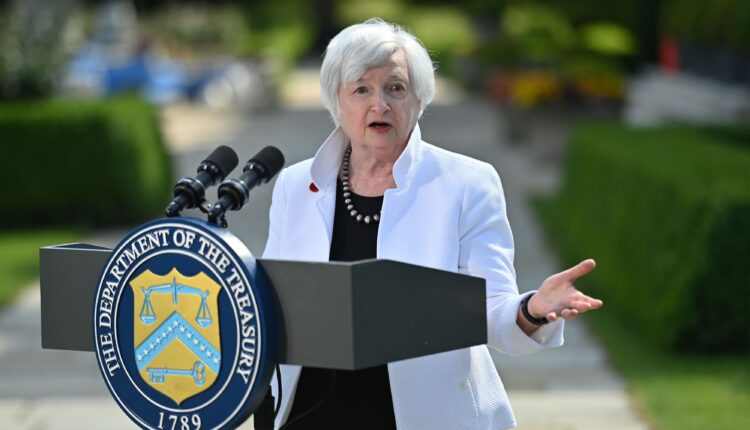U.S. Treasury Secretary Janet Yellen speaks during a news conference, after attending the G7 finance ministers meeting, at Winfield House in London, Britain June 5, 2021.
Justin Tallis | Reuters
WASHINGTON – Treasury Secretary Janet Yellen announced Thursday that a group of 130 nations has agreed to a global minimum tax on corporations.
If widely enacted, the GMT would effectively end the practice of global corporations seeking out low-tax jurisdictions like Ireland and the British Virgin Islands to move their headquarters to, even though their customers, operations and executives are located elsewhere.
“For decades, the United States has participated in a self-defeating international tax competition, lowering our corporate tax rates only to watch other nations lower theirs in response. The result was a global race to the bottom: Who could lower their corporate rate further and faster? No nation has won this race,” said Yellen in a statement on the accord.
“Today’s agreement by 130 countries representing more than 90 percent of global GDP is a clear sign: the race to the bottom is one step closer to coming to an end,” said Yellen. “In its place, America will enter a competition that we can win; one judged on the skill of our workers and the strength of our infrastructure.”
Much of the groundwork for adopting a GMT has already been laid by the Organization for Economic Cooperation and Development, or OECD, which released a blueprint last fall outlining a two-pillar approach to international taxation.
The OECD Inclusive Framework on Base Erosion and Profit Shifting, known as BEPS, is the product of negotiations with 137 member countries and jurisdictions.
Yellen also noted in her statement Thursday that the GMT agreement represents a key part of what President Joe Biden has called “a foreign policy for the middle class.”
The strategy, devised in part by Biden’s national security adviser Jake Sullivan, emphasizes how foreign policy and domestic policy can be integrated into a new middle ground between the traditional conservative and liberal approaches to global affairs.
“Foreign policy for the middle class” aims to ensure that globalization, trade, human rights and military might are all harnessed for the benefit of working Americans, not solely for billionaires and multinational corporations, but not for abstract ideological reasons either.
This is a developing story, please check back for updates.


